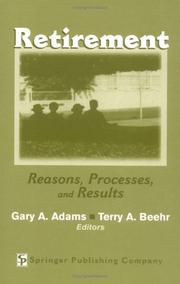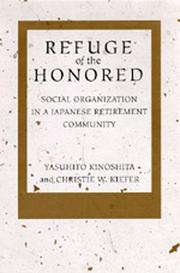| Listing 1 - 10 of 23 | << page >> |
Sort by
|
Book
ISBN: 1634855906 9781634855907 9781634855891 1634855892 Year: 2016 Publisher: New York
Abstract | Keywords | Export | Availability | Bookmark
 Loading...
Loading...Choose an application
- Reference Manager
- EndNote
- RefWorks (Direct export to RefWorks)
Employee fringe benefits --- Retirees --- Bankruptcy --- People, Retired --- Retired people --- Retired persons --- Persons --- Finance, Personal. --- Pensions --- Finance, Personal --- E-books

ISBN: 1501711725 9781501711725 0801444063 9780801444067 0801472520 9780801472527 Year: 2005 Publisher: Ithaca, N.Y.
Abstract | Keywords | Export | Availability | Bookmark
 Loading...
Loading...Choose an application
- Reference Manager
- EndNote
- RefWorks (Direct export to RefWorks)
Retirement brings with it the promises of leisure and freedom as well as the risks of boredom and isolation. When retirees rid their schedules of anything resembling the kinds of obligations that once had been imposed by work, they will experience a sometimes-uncomfortable absence of structure. In The Experience of Retirement, the distinguished sociologist Robert S. Weiss provides a detailed description of how some people plan their retirement, what life in retirement is like, and what makes for a fulfilling retirement. His engaging book can thus serve as a most useful guide. Weiss shows us both retirement's benefits and its possible costs, both the relief retirees can feel once free of work's stresses and constraints and the discomfort that can be caused by loss of the positive aspects of working life.The book is based on extensive interviews with eighty-nine men and women before and after their retirement from middle-income careers. Weiss makes vivid their experiences by presenting, in their own words, their descriptions of leaving their careers, considering what to do with their time, confronting issues of income in retirement, dealing, sometimes, with social isolation, and reorganizing their lives. The interviews reveal the way in which retirement affects marriages and other familial relationships. Weiss concludes by presenting advice about retirement based on the actual experiences of retirees. For anyone approaching the age of retirement or already retired and looking for a more satisfying post-career life, for personnel managers, health care professionals, and all those who provide services for the retired, The Experience of Retirement will be an illuminating guidebook to this phase of life.
Retirees --- Retirement --- People, Retired --- Retired people --- Retired persons --- Persons --- Older people --- Superannuation --- Termination of employment --- Leisure --- Old age
Book
ISBN: 9811626383 9811626375 Year: 2021 Publisher: Singapore : Springer,
Abstract | Keywords | Export | Availability | Bookmark
 Loading...
Loading...Choose an application
- Reference Manager
- EndNote
- RefWorks (Direct export to RefWorks)
Retirees --- Older people --- Health and hygiene --- Health and hygiene. --- Geriatrics --- People, Retired --- Retired people --- Retired persons --- Persons
Book
ISBN: 1447313321 1447313313 1447334507 1447313305 9781447334507 9781447313328 9781447313311 9781447313304 Year: 2015 Publisher: Bristol
Abstract | Keywords | Export | Availability | Bookmark
 Loading...
Loading...Choose an application
- Reference Manager
- EndNote
- RefWorks (Direct export to RefWorks)
The book offers a critical perspective, challenging positivistic, essentialist definitions of lifestyle migration. We follow the journeys of retired working-class British women as they seek, recreate and construct community in a new context.
Retirees --- Retired women --- Retirement, Places of --- Places of retirement --- Women pensioners --- Women retirees --- Women --- People, Retired --- Retired people --- Retired persons --- Persons

ISBN: 1281811238 9786611811235 082619737X 9780826197375 9781281811233 0826120547 9780826120540 0826120547 9780826120540 6611811230 Year: 2003 Publisher: New York Springer Pub.
Abstract | Keywords | Export | Availability | Bookmark
 Loading...
Loading...Choose an application
- Reference Manager
- EndNote
- RefWorks (Direct export to RefWorks)
This book reviews, summarizes, and integrates a diverse literature on the topic of retirement and provides a coherent view to better inform researchers and practitioners. Organized around three phases of the retirement process--pre-retirement, retirement decision-making, and post-retirement--the chapters examine economic, sociological, gerontological, and psychological theory and research. Topics discussed include: types of retirement, retirement planning and preparation, early retirement incentive programs, the economics of the retirement decision-making, and work after retirement, among othe
Retirement --- Retirees --- People, Retired --- Retired people --- Retired persons --- Persons --- Older people --- Superannuation --- Termination of employment --- Leisure --- Old age --- Decision making. --- Psychological aspects. --- Psychology. --- Attitudes. --- Economic conditions. --- Decision making --- Psychological aspects --- Psychology --- Attitudes --- Economic conditions

ISBN: 1282450999 9786612450990 1932031405 9781932031409 9781932031331 1890151874 9781282450998 6612450991 Year: 2002 Publisher: Philadelphia, Pa. Templeton Foundation Press
Abstract | Keywords | Export | Availability | Bookmark
 Loading...
Loading...Choose an application
- Reference Manager
- EndNote
- RefWorks (Direct export to RefWorks)
Dr. Harold G. Koenig, with expertise in the fields of geriatrics, mental health, and religion, explains that the notion of retirement was in fact a marketing tool developed in the post-World War II period. Continuing today, society's image of retirement is based largely on myths, such as: things will get better when you retire-you'll be able to do everything you wanted to but couldn't when you worked. In fact, these beliefs can be harmful, leading to emotional issues, identity crises, and problems with physical health.
Retirement. --- Retirees --- Self-actualization (Psychology) --- Growth, Personal --- Personal growth --- Self-improvement --- Self-realization (Psychology) --- Humanistic psychology --- Mental health --- Motivation (Psychology) --- People, Retired --- Retired people --- Retired persons --- Persons --- Older people --- Superannuation --- Termination of employment --- Leisure --- Old age --- Retirement
Book
ISBN: 3960676115 9783960676119 3960671113 9783960671114 Year: 2017 Publisher: Hamburg Anchor Academic Publishing
Abstract | Keywords | Export | Availability | Bookmark
 Loading...
Loading...Choose an application
- Reference Manager
- EndNote
- RefWorks (Direct export to RefWorks)
Older people --- Older unemployed --- Employment. --- Retirees --- Employment --- E-books --- Aged --- Aging people --- Elderly people --- Old people --- Older adults --- Older persons --- Senior citizens --- Seniors (Older people) --- Age groups --- Persons --- Gerontocracy --- Gerontology --- Old age --- People, Retired --- Retired people --- Retired persons

ISBN: 0520911784 0585102945 9780520911789 0520075951 9780520075955 9780585102948 Year: 1992 Publisher: Berkeley, CA : University of California Press,
Abstract | Keywords | Export | Availability | Bookmark
 Loading...
Loading...Choose an application
- Reference Manager
- EndNote
- RefWorks (Direct export to RefWorks)
Faced with the decline of the traditional family and the explosive growth of the over-65 population, the Japanese are looking for new ways to care for their elders. This study documents the birth of a major social phenomenon in Japan - the planned retirement community.
Retirement communities --- Retirees --- Older people --- Gerontology --- Social Welfare & Social Work --- Social Sciences --- Case studies. --- Attitudes --- Aged --- Aging people --- Elderly people --- Old people --- Older adults --- Older persons --- Senior citizens --- Seniors (Older people) --- People, Retired --- Retired people --- Retired persons --- Age groups --- Persons --- Gerontocracy --- Old age --- Retirement, Places of --- Housing
Book
ISBN: 3839422779 9783839422779 9783837622775 3837622770 1306996929 Year: 2014 Publisher: Bielefeld
Abstract | Keywords | Export | Availability | Bookmark
 Loading...
Loading...Choose an application
- Reference Manager
- EndNote
- RefWorks (Direct export to RefWorks)
Wir leben in einer Zeit der weitreichenden Transformation des Sozialen: In Politik und Wirtschaft setzt sich ein Menschenbild durch, das von jedem Einzelnen erwartet, sich flexibel und vorsorgend, selbsttätig und eigenverantwortlich zu verhalten. Diese neue politische Ökonomie der Aktivgesellschaft greift dabei auch auf bislang verschonte Lebenssphären und -phasen über. So ist die politische Programmformel des »active aging« längst auch zu einem Teil der Fremd- und Selbstbeschreibung älterer Menschen geworden. Der Band untersucht den Wandel des politisch-medialen Altersbildes, konfrontiert diesen mit den Erzählungen älterer Menschen zu ihrem Leben im Ruhestand und überführt die Befunde in eine originelle Zeitdiagnose der alternden Gesellschaft. »Die Studie [bietet] eine überzeugende Rekonstruktion der diskursiven Neuverhandlung des Alters seit den 1980er Jahren, die viele substanzielle Einsichten auf einem hohen theoretischen Niveau entfaltet und nicht zuletzt auch sprachlich überzeugt.« Ludwig Amrhein, Soziologische Revue, 41/2 (2018) »Den AutorInnen [ist es] gelungen, die vielen widersprüchlichen Facetten eines brisanten Themas zu durchleuchten und beeindruckend vorzuführen, wie problematisch das Konzept der Altersaktivierung ist. Kritische Sozialforschung in Bestform!« Esther Gajek, Bayerisches Jahrbuch für Volkskunde (2016) »Den AutorInnen gelingt es mit ihrem Buch, eine neue Perspektive der Altersforschung zu eröffnen, welche die Rede von den Potenzialen des Alters und den Aktivierungsdiskurs zu kritisieren vermag, da sie das Alter(n) im Kontext der Aktivgesellschaft und des flexiblen Kapitalismus betrachtet.« Benjamin Gerwoll Ronca, Schweizerisches Archiv für Volkskunde, 111 (2015) »Auch jenseits von besonderem Forschungsinteresse der/s Einzelnen oder speziellem Hintergrundwissen bietet das Buch eine interessante Lektüre. Werden die Alten in Zukunft durch die drohende Altersarmut bald doch so aktiv sein, wie es der Staat sich jetzt schon wünscht? Das lesenswerte Buch liefert zu dieser Debatte einen wichtigen Beitrag.« Lea Arnold, kritisch-lesen.de, 07.04.2015 »Auch wenn der Leser durch die [...] Begrifflichkeit der Autoren gefordert ist: Ihre Ergebnisse öffnen ihm die Augen über so manche politische Dimension des Alters, von dem er bisher vielleicht geglaubt haben mochte, es sei eine bloß biologische Tatsache.« Peter Meisenberg, WDR5 - Politikum, 23.07.2014 »Ein hochinnovatives, methodisch fundiertes und in jeder Hinsicht beeindruckendes Zeugnis dafür, über welche Potentiale die Soziologie als ›kritische Wissenschaft der alternden Gesellschaft‹ verfügt. Es [stellt] eine lange Zeit vermisste Gegenstimme zum vermeintlich unproblematischen Alters-Aktivierungsdiskurs dar. Es ist damit nicht nur für die Scientific Community von größtem Interesse, sondern dürfte auch über die Grenzen des Fachs und der Wissenschaft hinaus für Aufsehen sorgen. ›Leben im Ruhestand‹ hat [...] beste Chancen, zu einem jener Standardwerke zu werden, hinter das die Gerontologie nicht mehr zurückfallen kann.« Sven Schwabe, www.socialnet.de, 27.05.2014 Besprochen in: Süddeutsche Zeitung, 29./30.03.2014 Schweizer Arbeitgeber, 7 (2014) www.lehrerbibliothek.de, 07.07.2014, Dieter Bach Bundeszentrale für gesundheitliche Aufklärung, 7 (2014) Soziale Arbeit, 10/11 (2014) Stadtpunkte, 2 (2014) BBE-Newsletter, 4 (2014) Erziehungswissenschaftliche Revue, 14/2 (2015), Frank Ragutt Philosophische Rundschau, 62/1 (2015), Martin Gessmann/Martina Schmidhuber
Retirement --- Old age pensions --- Aging --- Retirees --- Older people --- Superannuation --- Termination of employment --- Leisure --- Old age --- People, Retired --- Retired people --- Retired persons --- Persons --- Social aspects --- Social conditions. --- Alter; Demographie; Lebensführung; Wohlfahrtsstaat; Sozialstaat; Ost-West-Vergleich; Aktivierung; Neoliberalismus; Gesellschaft; Soziologische Theorie; Bevölkerung; Sozialpolitik; Soziologie; Aging Studies; Neoliberalism; Society; Sociological Theory; Population; Social Policy; Sociology --- Neoliberalism. --- Population. --- Social Policy. --- Society. --- Sociological Theory. --- Sociology.
Book
ISBN: 9811669988 9811669996 Year: 2022 Publisher: Singapore : Palgrave Macmillan,
Abstract | Keywords | Export | Availability | Bookmark
 Loading...
Loading...Choose an application
- Reference Manager
- EndNote
- RefWorks (Direct export to RefWorks)
Emigration and immigration --- Retirees. --- Social aspects. --- Developing countries --- Emigration and immigration. --- People, Retired --- Retired people --- Retired persons --- Persons --- Emerging nations --- Fourth World --- Global South --- LDC's --- Least developed countries --- Less developed countries --- Newly industrialized countries --- Newly industrializing countries --- NICs (Newly industrialized countries) --- Third World --- Underdeveloped areas --- Underdeveloped countries
| Listing 1 - 10 of 23 | << page >> |
Sort by
|

 Search
Search Feedback
Feedback About UniCat
About UniCat  Help
Help News
News